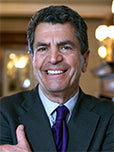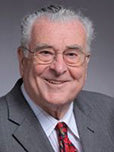Medical Advisory Board
|
|
Mitchell Rosenthal, M.D.Mitchell S. “Mitch” Rosenthal, M.D. is president of the Rosenthal Center for Addiction Studies. A pioneer in the treatment of substance abuse, Dr. Rosenthal was founder of Phoenix House, the nation's leading private, non-profit provider of substance abuse services. He began work in the field in 1965 as a psychiatrist at the U.S. Naval Hospital in Oakland, California (1965-1967), where he established the first service-sponsored therapeutic community, successfully treating both alcoholics and drug addicts. As a leading advocate for the treatment community, Dr. Rosenthal chaired the New York State Advisory Council on Substance Abuse from 1985 to 1997. He has been a White House advisor on drug abuse and a special consultant to the Office of National Drug Control Policy. He is a lecturer in psychiatry at Columbia University College of Physicians and Surgeons, and was awarded an honorary degree (Doctor of Humane Letters) by SUNY Downstate Medical Center in 2002. |
|
|
Robert Cancro, M.D.Since 1976, Dr. Cancro has been a Professor and Chairman of the Department of Psychiatry at New York University School of Medicine, Director of Psychiatry at New York University Hospital and Director of the Nathan S. Kline Institute for Psychiatric Research. Dr. Cancro served as a Professor in the Department of Psychiatry at the University of Connecticut Health Center until 1976. Dr. Cancro is a widely published, internationally recognized psychiatrist and educator, having received numerous honors and awards. He is on the editorial board of several scientific journals and is an examiner for the American Board of Psychiatry and Neurology Inc. Dr. Cancro is a Fellow of the American Psychiatric Association, the American College of Psychiatrists and the American College of Physicians. He is also a member of the Expert Advisory Panel on Mental Health for the World Health Organization and the Research Advisory Committee of the United States Secret Service. Dr. Cancro is the President and a Director of the International Committee Against Mental Illness and Chairman of the Section on Psychiatric Rehabilitation of the World Psychiatric Association. |
|
|
Lauri Liskin, M.D.Dr. Liskin is Clinical Assistant Professor of Psychiatry at Weill Cornell Medical College and on the attending staff at New York Presbyterian Hospital. Dr. Liskin entered medicine with a foundation in neuroscience and neurobehavioral research. She was the recipient of a Howard Hughes Medical Institute Award and published electrophysiology research on Circadian Rhythms. She did her Psychiatry residency training at Cornell, a Forensic Psychiatry fellowship at Albert Einstein College of Medicine, and completed the Psychodynamic Psychotherapy program at the Columbia Center for Psychoanalytic Training & Research. She has been in private practice in New York City since 1999. Dr. Liskin has broad clinical experience with diverse patient populations in a wide array of inpatient and outpatient settings in various public and private institutions. Her expertise in integrative psychiatry evolved from her focus on patients’ treatment needs and her commitment to ongoing education as a psychopharmacologist and psychotherapist. As a clinician assessing psychiatric adverse events, Dr. Liskin has been involved in obesity studies at the Comprehensive Weight Control Program affiliated with Weill-Cornell. Dr. Liskin is the recipient of a Creativity and Leadership Commendation from the Association of Women Psychiatrists. She currently serves on the American Psychiatric Association’s New York State District Branch Practice Committee as well as its Integrative Psychiatry Task Force.
|
|
|
Stephen N. Xenakis, M.D.Dr. Xenakis served 28 years in the United States Army as a medical corps officer. He held a wide variety of assignments as a clinical psychiatrist, staff officer, and senior commander including Commanding General of the Southeast Army Regional Medical Command. Dr. Xenakis has written widely on medical ethics, military medicine, and the treatment of detainees. He has published editorials in the Washington Post and a number of other national magazines and journals, including book chapters and legal reviews. Dr. Xenakis has an active clinical and consulting practice, and is currently working on the clinical applications of quantitative electroencephalography (QEEG) to brain injury and other neurobehavioral conditions.
|
|
|
Frank M. Ochberg, M.D.Frank M. Ochberg, M.D., served in uniform during the Vietnam era and advises several nonprofit veterans organizations. He is a founding board member of the International Society for Traumatic Stress Studies and recipient of their highest honor, the Lifetime Achievement Award. He edited the first text on the treatment of post-traumatic stress disorder after serving on the committee that defined PTSD. He was associate director of the National Institute of Mental Health and director of the Michigan Department of Mental Health. At Michigan State University, he is clinical professor of psychiatry, formerly adjunct professor of criminal justice, and adjunct professor of journalism. Ochberg developed, with colleagues, the Academy for Critical Incident Analysis at the John Jay College of Criminal Justice, Gift From Within (a nonprofit for persons with PTSD), and the Committee for Community Awareness and Protection (responding to serial-killer threats). For the latter activity, he is the first physician to receive the Law Enforcement Medal of the Sons of the American Revolution. Ochberg founded the Dart Center for Journalism and Trauma, served as its first chairman and now helps journalists understand traumatic stress and traumatic stress experts understand journalists. As a Red Cross volunteer, Ochberg assisted families at sites of earthquakes, floods, fires and aircraft disasters.
|
|
|
Ronald Podell, M.D.Dr. Podell is a board certified psychiatrist. He graduated with honors from Amherst College and received his medical degree from Columbia University. He completed his post-graduate psychiatry training at UCLA and was named to the Clinical Faculty in 1979. He served over 20 years as Assistant Clinical Professor of Psychiatry. He regularly teaches post-graduate courses for both mental health professionals and laymen and has been course director for two national symposia. Dr. Podell was one of the founding physicians for the Century City Hospital in Vitro Fertilization Program. He was then named to co-direct the hospital´s Center for Sexual Medicine, which offered multi-disciplinary treatment for sexual dysfunction. He co-founded the Center for Mood Disorders in West Los Angeles in 1984 and the Westridge Psychiatric Medical Group in 1989. Dr. Podell has published articles in academic and lay journals and is the author of Contagious Emotions – Staying well when your loved one is depressed. He has extensive media experience including local and national television, radio, newspapers and magazines. His most recent endeavor is the founding of the Center for Bio-Behavioral Science, a multi-disciplinary center devoted to the diagnosis of memory problems in older adults and attention and learning problems in young adults.
|
|
|
Kelly Brogan, M.D.Dr. Brogan is boarded in Psychiatry/Psychosomatic Medicine/Reproductive Psychiatry and Integrative Holistic Medicine, and practices Functional Medicine, a root-cause approach to illness as a manifestation of multiple-interrelated systems. After studying Cognitive Neuroscience at M.I.T., and receiving her M.D. from Cornell University, she completed her residency and fellowship at Bellevue/NYU. She is one of the nation's only physicians with perinatal psychiatric training who takes a holistic evidence-based approach in the care of patients with a focus on environmental medicine and nutrition. She is also a mom of two, and an active supporter of women's birth experience. She is the Medical Director for Fearless Parent, and an advisory board member for GreenMedInfo.com, Fit Pregnancy, Pathways to Family Wellness, NYS Perinatal Association, and Fisher Wallace. She practices in NYC and lectures nationally.
|
|
|
Bruce Johnson, M.D.Dr. Johnson is a Staff Psychiatrist at Crozer Medical Center. Board-certified in psychiatry and neurology, and a certified psychoanalyst, Dr. Johnson’s specialties include psychoanalysis, psychotherapy, pharmacotherapy and depression. Dr. Johnson earned his medical degree at George Washington Medical School, Washington, D.C. He completed his internship at Ohio State University, in Columbus, Ohio and his residency at Saint Elizabeth’s Hospital in Washington, D.C. and Chestnut Lodge Hospital in Rockville, Maryland. While serving in the military, Dr. Johnson served as Chief of Psychiatric Department at the Public Health Service Hospital in Baltimore, Maryland and as a consultant for the Peace Corps Volunteers.
|
|
|
Sandlin Lowe, M.D.Dr. Lowe is on the Faculty of the New York University School of Medicine and holds appointments in both the Department of Psychiatry and the Department of Physiology and Neuroscience. He is Consulting Psychiatrist to the Brain Research Laboratories and Collaborating Psychiatrist at the Center for Neuromagnetism. He also is the Chief of Psychiatry Assessment Services at Woodhull Medical Center. Dr. Lowe is an expert in Translational Neuroscience and has created new paradigms for the conceptualization, evaluation and treatment of consciousness spectrum disorders in patients with brain injuries. The theoretical basis for this work is founded upon his research with Dr. Rodolfo Llinas and Dr. E. Roy John, two of the Fathers of modern day neuroscience. Lately, for personal reasons, his efforts have been directed towards autism spectrum disorders. Dr. Lowe has particular interest in combining small molecules and cellular and regenerative medicine techniques with applied field energy therapies in the design of new treatment protocols for autism.
|
Our History
Invented by brilliant engineers Saul and Bernard Liss, the Fisher Wallace Stimulator® received FDA clearance for the treatment of depression, anxiety, insomnia and chronic pain in 1990.
In 2001, renowned addictionologist Martin Wallace, PhD, CCN, CAd, was unable to find any means of coping with the depression that brought him to a standstill in the aftermath of eight hours spent trapped in a building at Ground Zero on 9/11. In 2002 he discovered the Stimulator and used it to successfully treat his depression.
Martin Wallace later met Charles Fisher, a serial entrepreneur and the son of radio pioneer Avery Fisher, at a business conference in 2003. Mr. Fisher was impressed by the Stimulator's lack of side effects and its ability to stimulate the brain's production of key neurochemicals such as serotonin and endorphins. After Dr. Liss passed away in 2006 at the age of 84, Charles Fisher and Martin Wallace purchased the patents to the device and named it the Fisher Wallace Stimulator®.
Cofounder Kelly Roman leads the company's marketing, ecommerce and regulatory affairs.
For more than two decades, renowned institutions such as Harvard Medical School, Columbia University Medical School and the Family Bipolar Center at Beth Israel Hospital have conducted and published definitive research on the Fisher Wallace Stimulator®. Today the Fisher Wallace Stimulator® is one of the safest and most effective non-drug treatment options for insomnia, anxiety, depression and pain.

Fisher Wallace founding executives Kelly Roman and Charles Fisher flank Medal of Honor recipient SFC Petry.
A Message From Our Cofounders

Fisher Wallace founding executives Kelly Roman and Charles Fisher flank Medal of Honor recipient SFC Petry.
It has been extremely satisfying to build Fisher Wallace Laboratories into a respected, industry-leading medical device company. In 2014, Inc. magazine ranked Fisher Wallace as one of the fastest growing private companies in America; in 2016, Forbes magazine ranked our device as "one of four technologies innovating mental health." This is the result of our relentless focus on clinical research, including our published bipolar depression study at Mount Sinai Hospital, and the success we've had in treating over 20,000 patients.
Our patented technology is helping to drive a revolution in healthcare that embraces neurostimulation as an alternative and adjunct to medication. If you have any questions or concerns, please chat with one of our team members online, call us or email us – we’re here to help and want you to be completely satisfied with your experience.
Sincerely,
Charles Avery Fisher
Kelly Roman
Cofounders









